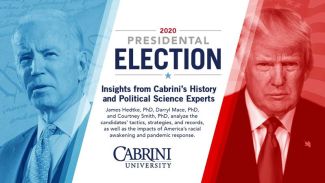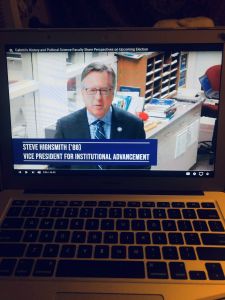After the president serves four years in office, it’s election time. The people decide to elect someone new or re-elect the current president for another four years.
In most cases, elections cause fights between the two parties, the Democrats and Republicans. However, the 2020 election is slightly different since the pandemic reached the United States at the beginning of the year.
On Oct.13, there was a perspectives panel on the upcoming election featuring history and political science faculty. This panel discussed COVID-19, types of presidential behavior, voter turnout, and voters’ thought process.

COVID-19’s effect on the election
A significant issue for many people has been for years and typically is the Affordable Care Act. However, a different matter this year is the pandemic. One can see how big an issue the pandemic has become by just looking at significant news sources.
“COVID-19 unintentionally is a symptom of what our country is facing in terms of a crisis of character,” Dr. James Hedtke, history and political science professor, said. “In many ways, COVID-19 is the crisis that has shown more than anything else what kind of leader the president needs to be for the people. Even if the president has a good team surrounding them, ultimately, the country’s leadership is in the hands of the president.”
“In the case of our current president, if the president isn’t willing to acknowledge that the crisis exists and is focused too much on the election,” Dr. Courtney Smith, history and political science professor, said, “that president is likely to minimize it to the point of actually becoming a victim of the health crisis that we are facing.”
A news source like the New York Times emphasizes that the central issue of the election is COVID-19. However, many people tend to grab on to one idea and miss that the problem might be more complex than most think. What people might miss is that COVID-19 is part of the concept of race. More Blacks, Indigenous and people of color are infected with COVID-19. Since they are more likely to die, that leads to race becoming an issue when we talk about COVID-19. Other aspects that become an issue when talking about COVID-19 are the leadership and stability of the nation. This shows that it’s never one issue but an intersection for other problems.
Presidential behavior
Good presidential behavior puts together a team of experts that you are willing to listen to and take their advice. It’s also about stability and security. Poor presidential behavior has a team that they don’t listen to and hides the truth from the American people.
The president should bring the right people together for the nation to become one during this election. During the election, the people see who can get the nation together as the country’s leader.
“This president hasn’t shown that he’s bringing the right people together,” Smith said. “This president doesn’t see himself as president of the United States but as the president of the people that support him.”
Voter Turnout
In 2016, voter turnout wasn’t at the same level as in some other elections. However, there have been approximately 50 million voters, as of Oct.23, which shows that voter turnout is slightly higher than it was four years ago. Something that might change voter turnout is early voting.
“I think we’re going to see an intersection of a racial awakening with an expansion of the voters,” Dr. Darryl Mace, chair of the history and political science department, said. “I think it’s actually going to lead to a transformational experience in terms of who gets elected and how they’re able to govern.”

Election results
This year’s election is uncharted territory for many people. Looking back at the 1864 election, one can see that it was the country’s heart and soul. This election also shed some light on the direction the country was going to go in and whether we would remain a democracy. In that election, George McClellan and Abraham Lincoln couldn’t stand each other. However, McClellan accepted the results.
In 1968, the election was as turbulent as it has been for this election. Richard Nixon and Hubert Humphrey never said that they wouldn’t accept the results, no matter how bad the election got during that year. People can see that this election is different because one presidential candidate says he won’t accept the results if they do not favor him.
Voters change their minds
The NYTimes released polling results from Wisconsin and Michigan. Four years ago, those two states voted for Donald Trump by small margins. Today the polls showed that Joe Biden has a 51 to 41 percent lead in Wisconsin and 48 to 40 percent lead in Michigan. Once NYTimes did more analysis, they noticed that Biden is getting some Trump voters from four years ago. As of now, it could be a landslide election, and no one knows who it could favor and how the electoral college can affect the outcome.


